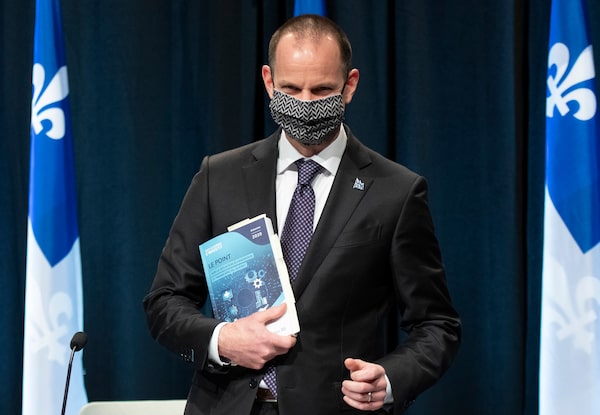
Quebec Finance Minister Eric Girard holds documents as he arrive to present an economic update, Thursday, November 12, 2020 in Quebec City.Jacques Boissinot/The Canadian Press
Quebec is projecting better economic days in 2021 thanks to promising vaccine news and boosted spending on pandemic measures, even though it will leave the province with a record $15-billion deficit.
Finance Minister Eric Girard presented a fiscal and economic update on Thursday pointing to spring as a moment when the next economic turnaround is likely to start after a hard winter. The provincial government’s finances are in for longer-term pain, however, with deficits of $8.2-billion and $7-billion projected over the two years after that.
The Quebec government promised to return to a balanced budget – the state of the province’s finances for five previous years — but Mr. Girard offered no timeline. That will come in the spring budget, he said. Quebec’s balanced-budget law requires the province to break even within five years of first posting a deficit.
Mr. Girard is counting on $5-billion in new federal transfers and the projected strong economic growth starting next year to meet deficit objectives. Negotiations on any new federal transfers to the provinces have not begun.
In the fiscal update one year ago, the province had a $4-billion surplus and economic growth well above of the national average. The pandemic provoked the biggest recession since the Second World War, and one of the worst crises in the province’s history, Mr. Girard said.
His financial planning relies on the likelihood of a widespread vaccination program by the end of 2021. He emphasized that much uncertainty lies ahead, but said that next spring’s budget will have a clear plan to balance the books.
“As much as I’m aware we are right in the second wave, that the next six months are going to be difficult, we have to be positive and ambitious for what comes after,” Mr. Girard said.
Spending on health care in 2020-21 is projected to grow 16.6 per cent because of pandemic measures, while education will grow 6.9 per cent. The government has spent $5-billion on health care since March, along with $5.9-billion in financial aid to citizens and businesses. It will spend $1.8-billion on economic recovery measures, including worker retraining, green initiatives and the province’s buy-local plan. “This is the start, so we are ready when the virus is under control,” Mr. Girard said.
Liberal Leader Dominique Anglade said she had hoped the government would have more ambitious plans for relaunching the Quebec economy. Liberal finance critic Carlos Leitao, who as finance minister balanced the province’s budget in 2015, said banking on a vaccine and optimistic economic projections is unrealistic. The government says the economy will grow 5 per cent next year after plunging 6 per cent in the current fiscal year.
“Sorry, I’m old enough to not believe in Santa Claus,” Mr. Leitao said. “I don’t see how you can have such a huge increase, a sudden increase in productivity that will lead us to a GDP growth of 3 per cent in 2022. That is just one example of the unrealistic foundations of this update.”
Last week, Ontario announced it faces a $38.5-billion deficit. Warren Lovely, an economist with National Bank of Canada, said in a research note that both Quebec and Ontario have incorporated “meaningful prudence, owing to elevated economic uncertainty and a worrisome trajectory for the virus” in their plans.
The city of Montreal presented a $6.2-billion budget on Thursday with a 0.2-per-cent property tax increase after $123-million in spending cuts earlier in the year and an injection of $263-million in cash from the provincial government.
Our Morning Update and Evening Update newsletters are written by Globe editors, giving you a concise summary of the day’s most important headlines. Sign up today.
 Les Perreaux
Les Perreaux